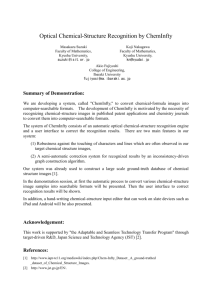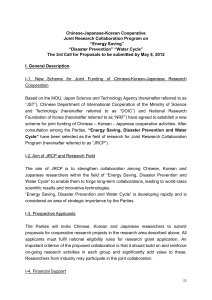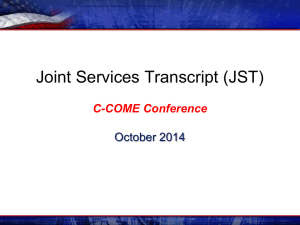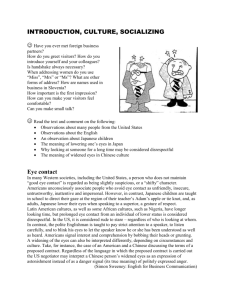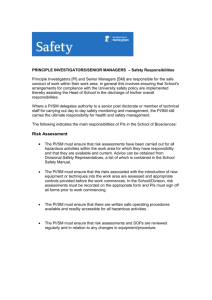附件3 Japanese-Chinese Research Cooperative Program on
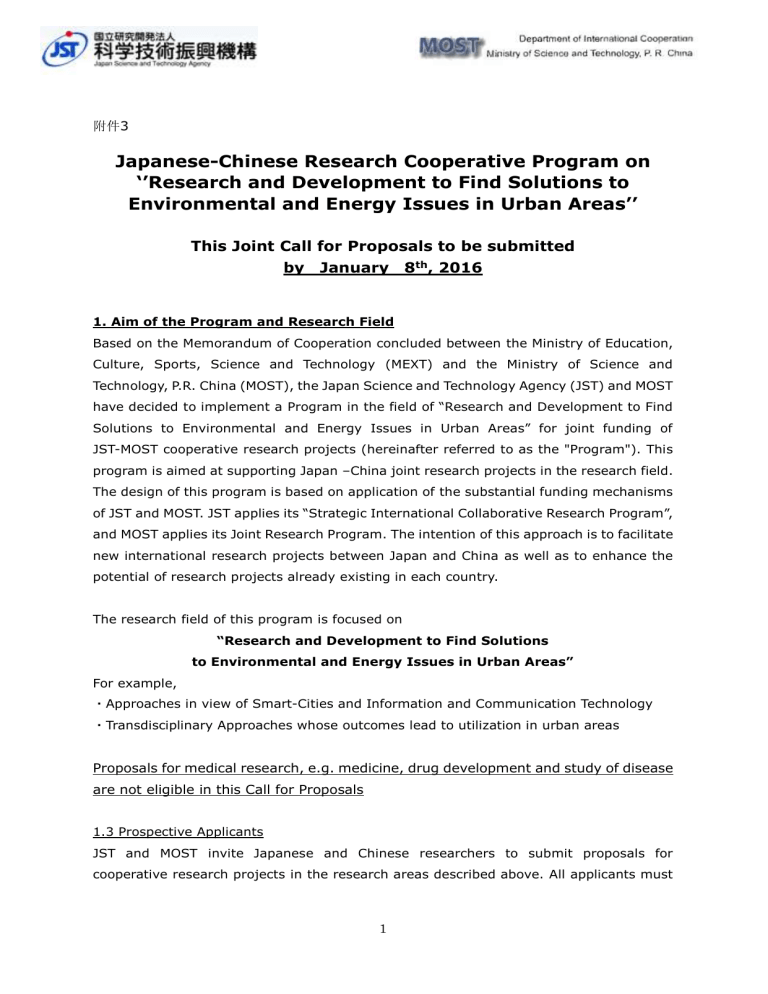
附件
3
Japanese-Chinese Research Cooperative Program on
‘’Research and Development to Find Solutions to
Environmental and Energy Issues in Urban Areas’’
This Joint Call for Proposals to be submitted by January 8
th
, 2016
1. Aim of the Program and Research Field
Based on the Memorandum of Cooperation concluded between the Ministry of Education,
Culture, Sports, Science and Technology (MEXT) and the Ministry of Science and
Technology, P.R. China (MOST), the Japan Science and Technology Agency (JST) and MOST have decided to implement a Program in the field of “Research and Development to Find
Solutions to Environmental and Energy Issues in Urban Areas” for joint funding of
JST-MOST cooperative research projects (hereinafter referred to as the "Program"). This program is aimed at supporting Japan –China joint research projects in the research field.
The design of this program is based on application of the substantial funding mechanisms of JST and MOST. JST applies its “Strategic International Collaborative Research Program”, and MOST applies its Joint Research Program. The intention of this approach is to facilitate new international research projects between Japan and China as well as to enhance the potential of research projects already existing in each country.
The research field of this program is focused on
“Research and Development to Find Solutions to Environmental and Energy Issues in Urban Areas”
For example,
・ Approaches in view of Smart-Cities and Information and Communication Technology
・ Transdisciplinary Approaches whose outcomes lead to utilization in urban areas
Proposals for medical research, e.g. medicine, drug development and study of disease are not eligible in this Call for Proposals
1.3 Prospective Applicants
JST and MOST invite Japanese and Chinese researchers to submit proposals for cooperative research projects in the research areas described above. All applicants must
1
fulfill national eligibility rules for research grant application. An important criterion of the proposed collaboration is that it should build on and reinforce on-going research activities in each team and significantly add value to them.
The Japanese applicant should be the Japan based Principal Investigator (leading scientist, who should be representative of research team in each country, hereinafter referred to as the “PI”), and must belong to a university, public research institute or industrial (private) research institute in Japan.
The Chinese applicant should be the China based PI must belong to a university, public research institute or industrial (private) research institute in China. Please read the
Chinese version of guidelines for details on the eligibility for Chinese applicants.
The Japan based PI and the China based PI in an Japan-China joint research project shall submit a common application (English version) and Japanese summary or Chinese application to both JST and MOST in parallel. In case of no submission to both JST and
MOST, the proposal shall not be accepted and not be brought to the evaluation process.
2. Support by JST and MOST
JST and MOST plan to support cooperative activities including exchange of researchers with the counterpart country. JST will provide support to the Japanese research team, and
MOST will support the Chinese research team.
2.1 Number of Adopted Projects
It is anticipated that up to 10 joint projects will be funded (dependant on the number and quality of proposals submitted).
2.2 Funding Period
The funding period shall be around three years in total. JST and MOST plan to begin support from April 2016, and will conclude its support at the end of March 2019.
2.3 Budget for Cooperative Research Projects
2.3.1 JST
Financial support will be implemented according to a research contract concluded between
JST and the university or research institute, etc. with which the Japan-based PI is affiliated.
The budget from JST is estimated be to from 18 to 30 million yen including 30% overhead expenses in principle over a full 3-year (i.e. 36 months) for each project, but the total budget for the Japanese research team should not exceed 30 million yen.
The budget for a
2
project may differ each year, depending on the content of activities, for example: a proposal may envisage a budget of 5 million yen for the first fiscal year, 7 million yen for the second fiscal year, and 6 million yen for the final fiscal year.) According to the budgetary limitations for this Program, the amounts will be adjusted each year.
2.3.2 MOST
The budget from MOST is 6 million RMB over a full 3-year period (i.e. 36 months) for each project.
2.4 Funded Expenses for Cooperative Research Projects
Funding provided within this call is intended to enhance the capacity of the applicants to collaborate. Funding will therefore be provided mainly in support of collaborative activities and may cover some of the local research expenses necessary for the collaboration.
(1) Expenses for research exchanges a) Travel expenses
In principle, provision of travel expenses should be based on the rules of the institution to which the Japan based PI or the China based PI belongs. JST will provide travel expenses only for the Japanese researchers, and MOST will provide them only for the
Chinese researchers. b) Expenses for holding symposia, seminars and meetings
(2) Expenses for research activities a) Expenses for facilities, equipment and consumables b) Expenses for personnel
・ Stipend for a PhD student, or stipend or salary for a post-doctoral fellow
*The cost of accident insurance and travel insurance are not covered. c) Others
Expenses for creating software, renting or leasing equipment, transporting equipment, etc.
(3) Overhead expenses a) JST
Overhead expenses should be, in principle, 30% of direct expenses as shown in (1) and
(2). Overhead expenses should be provided for within the total budget. b) MOST
Overhead expenses should be, in principle, about 5% of direct expenses as shown in (1) and (2). Overhead expenses should be provided for within the total budget.
3
(4) Expenses not covered/funded in the Program
The expenses stated below shall not be covered under this Program: a) Expenses related to acquiring real estate or constructing buildings or other facilities b) Expenses related to procurement of major equipment c) Expenses related to dealing with accidents or disasters which occur during cooperative research periods d) Other expenses unrelated to implementation of this cooperative research project
2.5 Contract
2.5.1 JST
JST's support will be implemented according to a multiple-year contract for commissioned research entered into between JST and the university or research institute, or similar institution (hereinafter referred to as the “institution”) to which the Japan based PI belongs.
Since the contract is agreed on condition that all administrative procedures related to this project are handled within the institution, the Japan based PI should consult with the relevant department(s) at his/her institution.
The contract between the Japanese institution and JST will stipulate that Article 19 of the
Industrial Technology Enhancement ACT (Japanese version of the Bayh-Dole Act) and
Article 25 of the ACT on Promotion of Creation, Protection and Exploitation of Content
(tentative translation) shall be applied to all intellectual property rights (patents, utility model or design rights, rights to programs, databases and other intangible property and know-how, and so on) generated as a result of this project, and that these can be the property of the institution with which the Japan based PI is affiliated.
2.5.2 MOST
Please make sure of MOST’s guidelines for its “Program of International S&T Cooperation” written in Chinese.
2.6 Contract between Researchers – Intellectual Property
The project participants’ organizations should enter into a Collaboration Agreement to specify at least how Intellectual Property Rights and non-disclosure agreements will be handled. A Collaboration Agreement will need to be signed among project participants after the grant notification has been made by JST and MOST.
Please summarize the outline of the discussion between Japanese and Chinese institutions in the Application Form.
4
3. Application
The application procedure for the Japan based PIs applying to JST is different from that for the China PIs applying to MOST. This reflects the different circumstances of the funding organizations, applicants and the relations between them.
The Japan based PIs must submit their application forms to JST through the cross-ministerial R&D Management System (e ・ Rad) .
The China based PIs must apply their applications to MOST through its on-line application system.
To prevent duplication of effort for PIs are only required to fill in one English form & submit this to both JST & MOST. Japan based PIs are also required to submit additional Japanese forms, while China based PIs are also required to submit additional Chinese forms which are designated by MOST.
In case that the submission is not recognized by both JST and MOST, the proposal shall not be accepted and not be brought to the evaluation process.
Both applications to JST and to MOST must contain: a) A project description stating how the collaboration will be conducted, with clear statements of what roles the Japanese research team and the Chinese research team will play in the project. Opportunities for the involvement of early stage researchers should also be stated. b) The expected outcome(s) of the proposed project, including scientific objectives, and the relevance to industry and society. c) The ongoing activities and specific expertise of the Chinese and Japanese teams, which form the basis for the proposed joint project, including how the skills, technologies and other resources in each team complement each other. Details of any existing links between the teams should also be included. d) The expected added value from the proposed joint project, including how the competence, technology and other resources in each team complement each other, the multidisciplinary approach, and how this will help to strengthen research cooperation between Japan and China in the long term. e) Discussion of how the proposed joint project compares with other comparable activities worldwide. f) A breakdown of the costs involved including details of any funds sought or provided from other sources that support the existing on-going activities .
5
3.1 Application Forms
The following application forms must be prepared in English (E) by the Japan based PI and the China based PI of a joint project after their consultation.
Japan based PIs are also required to submit summery in Japanese, while China based PIs are required to submit additional Chinese forms which are designated by MOST’s Call for
Proposals.
Form 1E Application outline (title of joint research project, thematic area of the proposal, keywords, names of PIs)
Form 2E Summary (objectives, added value to state of the art, technical approach, expected research results, short abstract, illustrations)
Form 3E Description of joint research project, work plan, research networking plan, research infrastructures and management of intellectual property)
Form 4E Budget plan for the project (for Japanese side and Chinese side)
Form 5E Information on PIs (their CVs*)
Form 6E List of the names of individuals committed to the joint research project in
Japan and China
* This information should include short Curriculum Vitae (CV) from both Japanese and
Chinese PIs, which include basic information on education, past and present positions held, membership of relevant organizations/associations, and their five most significant papers over the past 5 years. Each description should be no more than 1 page of A4.
3.2 JST
The Japan based PIs must apply and send their application forms to JST through e ・ Rad: http://www.e-rad.go.jp/jigyolist/present/index.html
Guidance and application forms can be found at http://www.jst.go.jp/sicp/announce_ch_MOST1st.2015.html
3.3 MOST
The China based PIs must apply and send their application forms to MOST through its online system.
3.4 Submission of Application Forms for Japan based and China based PIs
Applicants to this call for proposals should send their applications by January 8 th , 2015.
The deadline for submission by Japanese applicants is 17:00 (Japanese Standard Time) on
6
January 8 th , 2015.
The deadline for submission by Chinese applicants is 17:00 (China Standard Time) on
January 8 th , 2015.
4.
Evaluation of Project Proposals
4.1 Evaluation Procedure
Committees consisting of experts selected by JST and MOST respectively will evaluate all proposals. Based on the results of the evaluation, JST and MOST will make a joint decision regarding funding of the selected proposals.
4.2 Evaluation Criteria
The following general evaluation criteria will apply to each application: a) Conformity with Program aims and designated research fields
The proposed activity shall conform to the aims of the Program and the designated research fields. In addition, the applicants shall already have a good research foundation for their proposed activity. b) Capability of research leaders (PIs)
The research leaders (PIs) in both countries shall have the insight or experience (or potential, in the case of younger researchers) necessary for pursuing the activity, and the ability to manage the cooperation and to achieve the project goals during this
Program’s period of support. c) Effectiveness and synergy of the joint research project
The proposed research activity shall be eminent, creative and at an internationally high level in an attempt to produce a significant impact on the development of future science and technology or to resolve global and regional common issues, or to create innovative technological seeds that can contribute to the creation of new industries in the future.
Moreover, proposed research activities that are expected to create synergy from the collaborative research with the counterpart institution are preferred. For example, synergistic effects could be attained through the acquisition and/or application of knowledge, skills and/or know-how of the counterpart researchers. d) Validity of the research plan
The share of research activities with the counterpart research institute and the budgetary plan for research expenses shall be adequate to realize the proposed research activity.
7
e) Effectiveness and continuity of exchange
Activities characterized by the following examples shall be involved to enhance sustainable research exchange and networking.
-
Nurturing researchers through human resource exchanges
-
Sustainable development of future research exchange with the counterpart country, initiated by this research activity
-
Enhancing research networks between the counterpart countries, including links among researchers other than the research leaders (PIs) and members of this activity
-Improving the presence of science and technology in Japan and China. f) Validity of the exchange plan
The plan for exchange activities and their related expenses with the counterpart research institute shall be adequate to realize the proposed research activity.
4.3 Announcement of Decision
Applicants will be notified of the final decision around the middle of April 2016, regarding which projects will be supported.
5. Responsibilities of PIs after Proposals are Approved
Once a proposal has been approved, its PIs and their affiliated institutions shall observe the following when carrying out the cooperative research and utilising provided funding.
5.1 For the Japan based PIs
5.1.1 Progress Report for JST
At the end of each fiscal year, the Japan based PI shall promptly submit to JST an annual report on the progress of the research collaboration, and the institution with which the PI is affiliated shall promptly submit a financial report to JST.
5.1.2 Final Report for JST
At the end of the period of international research exchange and after completion of the joint research activities, the Japan based PI shall promptly submit to JST respectively a final report which shall include a financial report and a description of the research activities. The report submitted to JST shall include a general summary (maximum five A4 pages) compiled jointly by both the Japanese and the Chinese research teams. If papers describing results of the research activities are presented to academic journals, societies and so on, a list of those papers and other related information should be attached to the final report.
Detailed instructions for preparation of the final report will be provided to the
8
the Japan based PI during the final year of project.
5.2 For the China based PIs
5.2.1 Annual Progress Report (MOST)
At the end of each fiscal year, the China based PI shall promptly submit a progress report to MOST.
5.2.2 Final Report (MOST)
After completion of the period of cooperative research, the China based PI shall promptly submit a final report to MOST.
9
Japanese applicants should contact the following for further information:
For Additional information: See (Annex) Additional Requirements for Japanese-side
Researchers (only in Japanese)
Mr. Minowa Dai, Dr. Daiji NAKA (Mr.)
Department of International Affairs
Japan Science and Technology Agency
Tel. +81(0)3-5214-7375 Fax +81(0)3-5214-7379
Email:
Chinese applicants should contact the following for further information:
Dr. Jiang Xiaoping
Department of International Cooperation
Ministry of Science and Technology, P.R.China
Tel. +86-10-5888-1342 Fax +86-10-5888-1344
Email:
10
